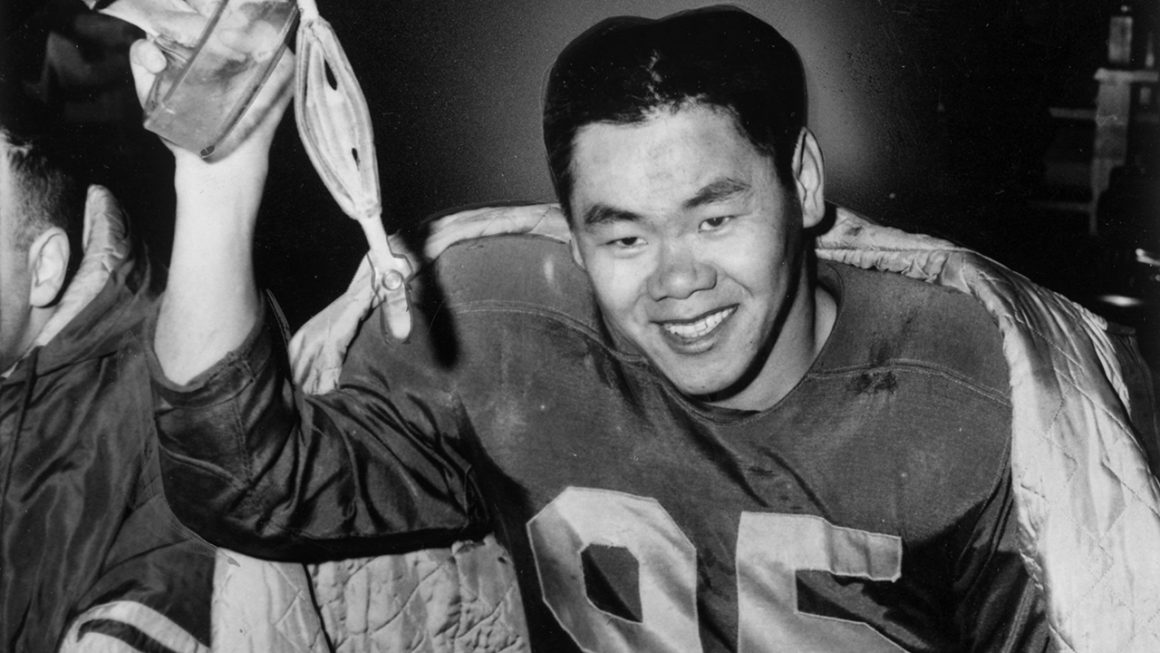
CFL Legend and former lieutenant-governor honoured in Heritage Minute , marking the importance of Asian representation in sports
By Maggie Hsu, February 1 2024—
Heritage Minutes have become somewhat of a meme in recent years with users on social media producing imitation images to convey the idea that a moment should be memorialized forever. However, they still hold significance in representing and teaching Canadians of our peoples, history and culture. Its collection has become a recognizable aspect of Canadian culture that is a key component of the Canadian experience. In August, Historica Canada, the producers of Heritage Minutes, announced an edition featuring Norman “Normie” Kwong to be released in 2024.
Kwong, also known by his Chinese name “Kwong Yew” or his nickname “The China Clipper” was born in 1929 in Calgary to Chinese immigrants turned grocers. They had immigrated to Canada from Canton, China, in the early 1900s, despite the $500 head tax the Canadian government required of Chinese immigrants. Kwong grew up in an era of Canada when the Chinese Exclusion Act was in effect and thus, denied Chinese-Canadians citizenship and didn’t let them vote until 1947. The Exclusion Act also limited social integration, and economic equality while also inadvertently encouraging hostility against Chinese communities in Canada as they and other visible minorities were blamed for poor economic conditions in the postwar period.
Despite the social climate, Kwong never accepted them as limits – he viewed them as challenges.
“Racism was much more prevalent at the time,” said Randy Kwong, Norman’s son, during his memorial after his passing, “He told me it fueled him. He was not advocating violence, but he taught me to rise above that.” And this was what defined Kwong’s legacy and success.
“My father was always one that said ‘Listen, let’s just be people, let’s give people credit where credit is due. Who cares what skin colour is… He just wanted people to be equal. He just wanted to be a guy from Bridgeland in Calgary playing football.” said his son, Greg Kwong, when speaking about his father
When attending Western Canada High School, Kwong joined the school’s football team. Despite his stature, Kwong succeeded in his position as a fullback, a position traditionally requiring size, strength, and speed, earning him his nickname of “The China Clipper” after the high-speed 19th-century merchant ships. His success brought him to his CFL debut with the Calgary Stampeders in 1948. That year, he became the first Chinese Canadian to play in the CFL and the youngest player to win a Grey Cup while helping the Stampeders to their first Grey Cup in franchise history at just 18 years old. Kwong would go on to win three more Grey Cups after joining the then, Edmonton Eskimos to help establish their football dynasty.
According to the CFL Hall of Fame for which Kwong was the Class of 1969, Kwong set more than 30 league records in his 13-season career, earning him the awards for Most Outstanding Canadian player in 1955 and 1956 as well as being named Canadian athlete of the year in 1955 over other well-known names like hockey greats Maurice “The Rocket” Richard and Jean Belliveau. After his retirement, he was inducted into the Canadian Football Hall of Fame, the Alberta Sports Hall of Fame, Canada’s Sports Hall of Fame and was made a Member of the Order of Canada in 1998, in recognition of his groundbreaking career in the CFL.
Even after retirement from football, Kwong never strayed far from sports. He returned to the Calgary Stampeders as president and general manager during the team’s “Save Our Stamps” era. In his 1988 to 1991 stint in the Stampeders’ Head Office, Kwong helped stabilize the team’s on-field product after a successful drive for ticket sales in 1986, bringing the team back to the Grey Cup in 1991. During this time, Kwong was also part-owner of the Calgary Flames, having been one of the members of the ownership group that brought NHL hockey to Calgary. He worked to establish the Flames as the Calgary staple that we know them as today and cemented this when the Flames won the franchise’s first and only Stanley Cup in 1989. This win put Kwong’s name in the history books as one of only five people who have their name on both the Grey Cup and the Stanley Cup. He would carry his philosophy of “I always want to be a winner” into his public service career as he was appointed Lieutenant Governor of Alberta from 2005 to 2010, making him the first Chinese Canadian to hold this role in Alberta. Kwong would use this opportunity to inspire immigrants to pursue their dreams in sports and education.
Kwong broke barriers in sports, business, and politics. This was echoed in his inspiration for those from minority communities to make contributions to Canadian society. At a time when racial diversity in professional sports was almost non-existent, his success showcased that talent and determination transcended racial and cultural differences when there is an elite athlete in a sport, they make an impact beyond play when they are entertaining their fans. Athletes act as role models for those that look like them while showing others that they are equal to their peers. With greater visibility and representation, the world of sports can evolve to include people of all backgrounds with hopes that sports can be more inclusive and there is less fear and hesitation from youth to pursue sports at a higher level. By being presented this Heritage Minute, Canadians can be reminded that while times were different 80 years ago, there is an opportunity to remember that racism and hostility towards Chinese Canadians and Chinese immigrants is not a historical issue.
This Heritage Minute will premiere in February and can be found on Historica Canada’s YouTube channel when it is released.
